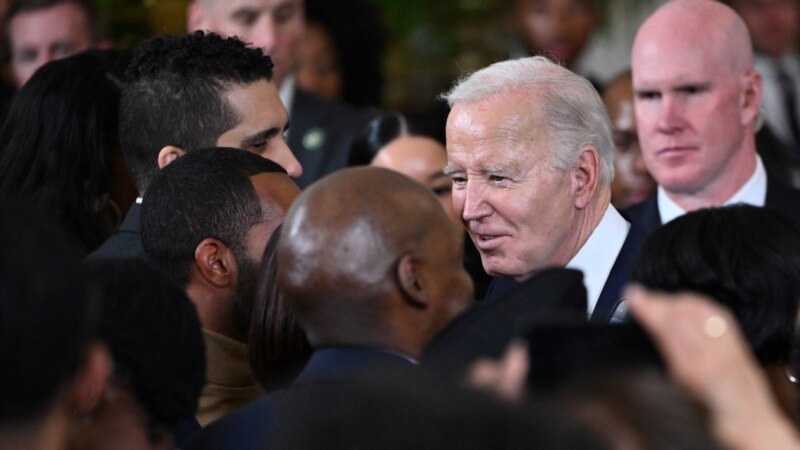
President Joe Biden celebrated Black History Month Tuesday at the White House amid slipping support from Black voters distressed by the administration’s stance on the war in Gaza and disillusioned by what they see as a lack of progress on Biden’s racial justice agenda.
“Tonight, let’s reflect on how we make history, not erase history,” Biden said Tuesday evening, taking a jab at Republican-controlled state legislatures that have introduced bills that would limit what schools can teach about race and American Black history.
Vice President Kamala Harris, who spoke before Biden, was more direct.
“Across our nation, we have witnessed extremists try to erase our history,” she said during the White House reception with Black leaders. “They censor history textbooks and cancel history classes.”
In a statement, the White House touted legislative victories and executive orders promoting racial equity that has seen a 60% increase in Black wealth since the pandemic, record levels of entrepreneurship, and significant reductions in child poverty. They highlighted support for Black-owned businesses, expanded access to affordable housing, improved educational opportunities and efforts to address health care and educational disparities.
Yet polls suggest support for the president among Black voters is slipping. A USA Today/Suffolk University poll released in January shows Biden carrying the support of just 63% of Black voters, a steep decline from the 87% he had in 2020.
Troubled by Gaza
As images of death and destruction in Gaza mobilized activists, a coalition of more than 1,000 Black faith leaders pressed Biden to call for a cease-fire between Israel and Hamas.
The campaign grew organically from the congregation, said the Rev. Timothy McDonald III, one of the first pastors who signed the open letter.
“They pushed us to make that statement,” said McDonald, founder of the African American Ministers Leadership Council and senior pastor of the First Iconium Baptist Church in Atlanta, Georgia.
“Young people were saying, ‘You’re all supposed to be faith leaders, and you’re doing nothing about all of this?’” McDonald told VOA. He noted that just as with the civil rights movement, the distress and anger felt by younger parishioners quickly spread to older members of the congregation.
Community leaders say that Black Americans who support Palestinian rights see the conflict through the lens of racial justice, with the solidarity of a minority group that knows how it feels to be oppressed, displaced and deprived.
Steve Phillips, author and founder of Democracy in Color, a political media organization, pointed to Martin Luther King Jr.’s 1967 “A Time to Break Silence” speech. In it, King denounced U.S. involvement in the Vietnam War as morally unjust and said it diverted Americans’ attention from racism and poverty at home.
“There’s just so much resonance and similarity to this same kind of a moment,” Phillips told VOA.”
Responding to international and domestic pressures, Biden has shown a more sympathetic tone toward Palestinians, saying last week he sees “the trauma, the death and destruction,” and understands “the pain and passion felt by so many here in America and around the world.”
The administration says a permanent cease-fire will only benefit Hamas at this point. But it is pushing for a deal that would secure a temporary halt in fighting in return for the release of Israeli hostages held by Hamas and release of Palestinians in Israeli prisons.
Waning enthusiasm
Even before the October 7 Hamas attack, there were signs of waning Black enthusiasm for Biden and frustration over the lack of progress on issues that emerged alongside the Black Lives Matter movement.
“There was a fairly high-profile announcement about efforts to look at racial justice when the president first came in. And then you never heard much follow-up after that,” Phillips said.
A bill designed to ensure that minority voters can participate equally in the electoral process, and a bill to prevent racial profiling by law enforcement have been languishing in Congress.
Only 50% of Black adults said they approve of Biden in a December AP-NORC poll, down from 86% in July 2021. Biden’s opponent is eager to capitalize.
“Joe Biden no longer has a base,” said Karoline Leavitt, national press secretary for the campaign of leading Republican nominee and former President Donald Trump.
“Key Democrat constituencies, such as African Americans, Hispanic Americans and women, are supporting President Trump because they are sick and tired of Crooked Joe’s record-high inflation, open borders, crime and chaos,” she told VOA.
With most polls showing Biden having a comfortable lead over Trump among Black voters, the bigger threat is not Black voters shifting to Trump but low voter turnout that could sway results in the most competitive states, including Georgia, Pennsylvania and Michigan.
Disinformation
Efforts to discourage voters of color from going to the polls are being fueled by voter suppression efforts, including through social media disinformation, said Atiba Ellis, a professor at Case Western Reserve University School of Law.
“This has a long history,” Ellis told VOA, pointing to intimidation in the 1860s by white supremacist groups to prevent recently freed enslaved people from participating in the political process and Jim Crow laws in the late 19th and early 20th centuries that prevented Black people from voting.
A source close to the Biden campaign, who asked not to be identified as is customary when discussing electoral strategy, said the campaign is combating disinformation with “early and substantial investments,” including $25 million in television and digital ad spending in August in top battleground states focusing on Black and Hispanic media.
“Making sure that the right and the correct information is out there,” the source said. “That’s how we can better combat the wrong information, with the right information.”
Black Americans, a group the president calls the “backbone of the Democratic Party,” number about 34.4 million and account for 14.0% of eligible voters in November, according to Pew Research Center projections.
